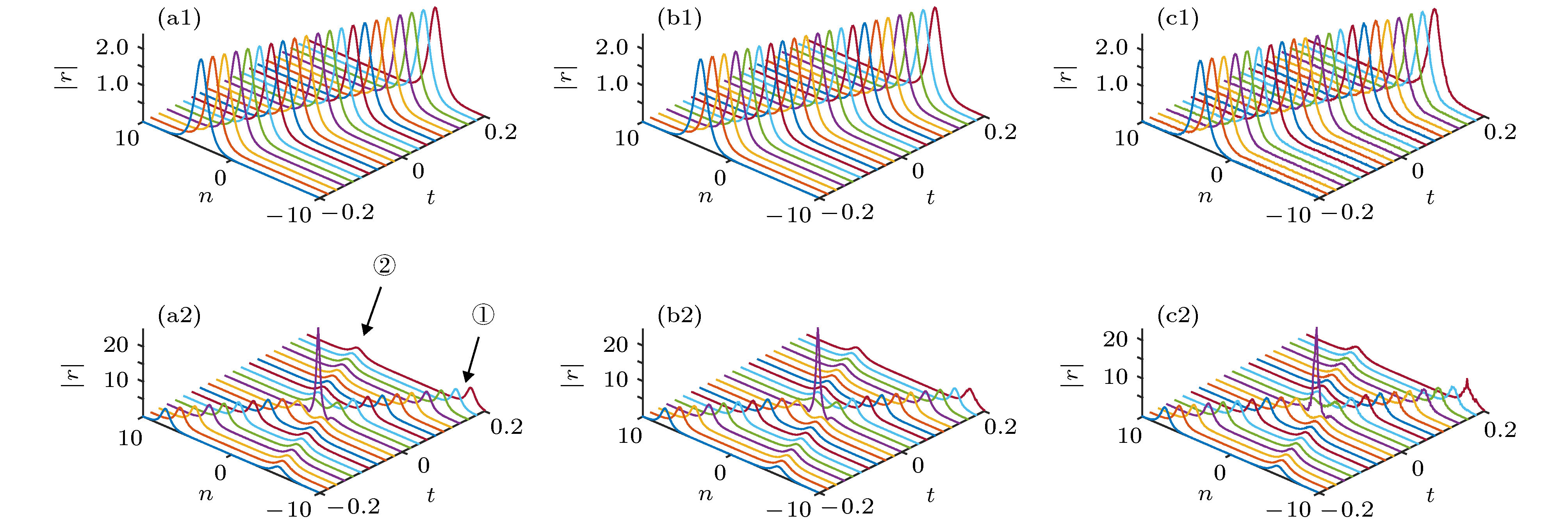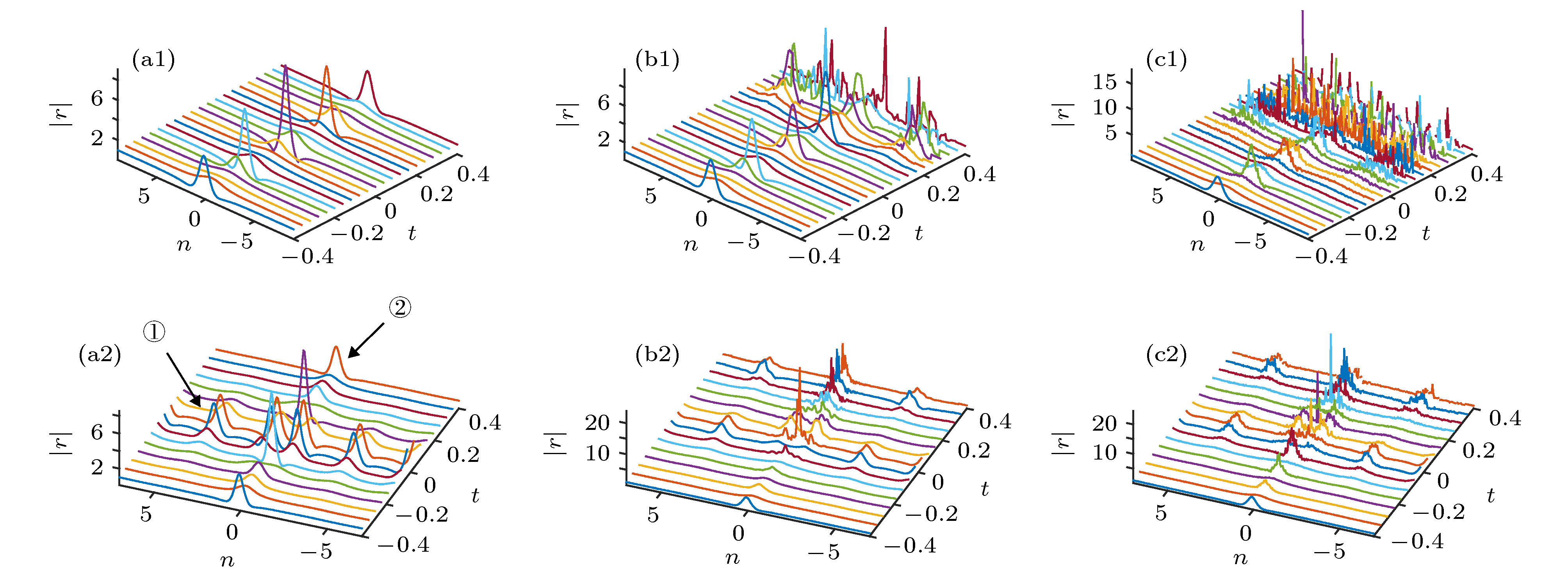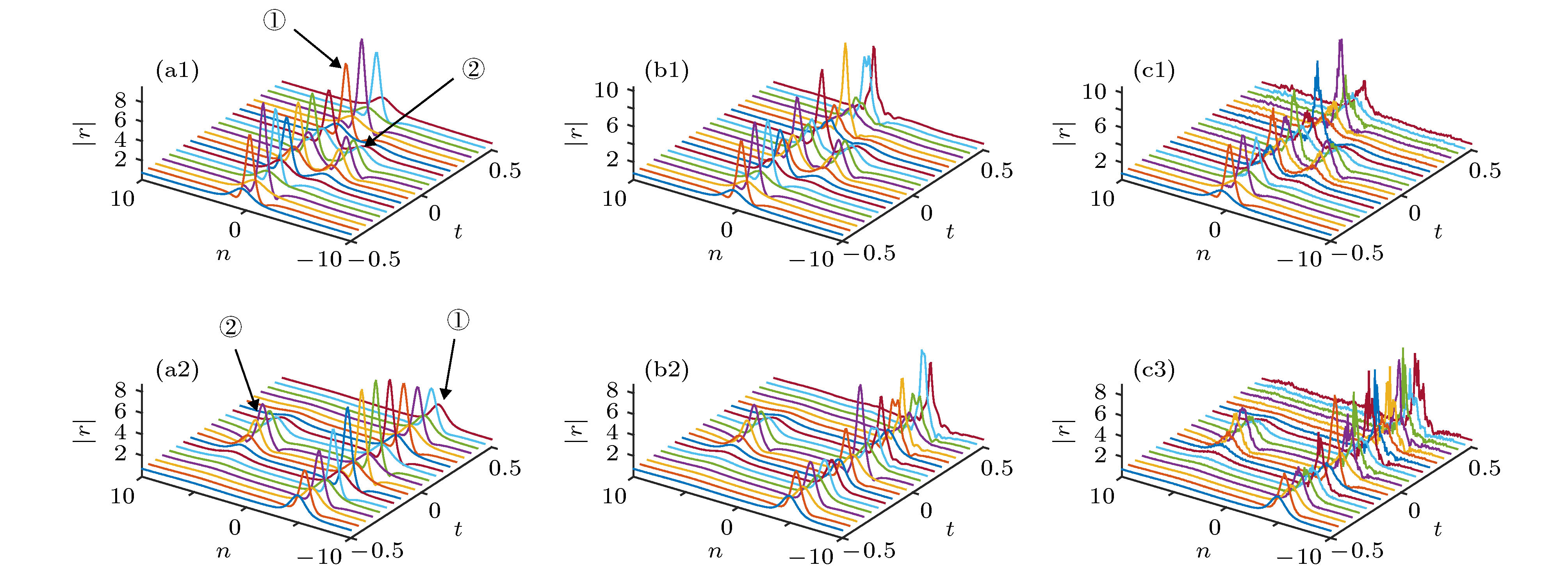-
本文构造了一类高阶Ablowitz-Ladik方程的广义
$(M, N-M)$ -波Darboux变换, 借助符号计算从不同背景出发研究了该模型丰富的局域波解, 并利用数值模拟研究了这些解的动力学稳定性.-
关键词:
- 高阶Ablowitz-Ladik方程 /
- 广义(M, N-M)-波Darboux变换 /
- 局域波 /
- 怪波
It is an important research topic to study diverse local wave interaction phenomena in nonlinear evolution equations, especially for the semi-discrete nonlinear lattice equations, there is little work on their diverse local wave interaction solutions due to the complexity and difficulty of research. In this paper, a semi-discrete higher-order Ablowitz-Ladik equation is investigated via the generalized$(M, N-M)$ -fold Darboux transformation. With the aid of symbolic computation, diverse types of localized wave solutions are obtained starting from constant and plane wave seed background. Particularly, for the case$M=N$ , the generalized$(M, N-M)$ -fold Darboux transformation may reduce to the N-fold Darboux transformation which can be used to derive multi-soliton solutions from constant seed background and breather solutions from plane wave seed background, respectively. For the case$M=1$ , the generalized$(M, N-M)$ -fold Darboux transformation reduce to the generalized$(1, N-1)$ -fold one which can be used to obtain rogue wave solutions from plane wave seed background. For the case$M=2$ , the generalized$(M, N-M)$ -fold Darboux transformation reduce to the generalized$(2, N-2)$ -fold one which can be used to give mixed interaction solutions of one-breather and first-order rogue wave from plane wave seed background. To study the propagation characteristics of such localized waves, the numerical simulations are used to explore the dynamical stability of such obtained solutions. Results obtained in the present work may be used to explain related physical phenomena in nonlinear optics and relevant fields.-
Keywords:
- higher-order Ablowitz-Ladik equation /
- generalized (M, N-M)-fold Darboux transformation /
- localized wave /
- rogue wave
[1] 尤福财 2008 博士学位论文 (上海: 上海大学)
You F C 2008 Ph. D. Dissertation (Shanghai: Shanghai University) (in Chinese)
[2] Toda M 1967 J. Phys. Soc. Jpn. 23 501
 Google Scholar
Google Scholar
[3] 李翊神 1999 孤子与可积系统 (上海: 上海科技教育出版社) 第25页
Li Y S 1999 Soliton and Integrable System (Shanghai: Shanghai Scientific and Technological Education Publishing House) p25 (in Chinese)
[4] 広田良吾 著 (王红艳, 李春霞, 赵俊霄, 虞国富 译) 2004 孤子理论中的直接方法(北京: 清华大学出版社) 第59页
Hirota R (translated by Wang H Y, Li C X, Zhao J X, Yu G F) 2004 The Direct Method in Soliton Theory (New York: Cambridge University Press) p59
[5] Yue Y F, Huang L L, Chen Y 2018 Comput. Math. Appl. 75 2538
 Google Scholar
Google Scholar
[6] Huang L L, Yue Y F, Chen Y 2018 Comput. Math. Appl. 74 831
[7] Liu C, Yang Z Y, Yang W L, Akhmediev N 2019 J. Opt. Soc. Am. B 36 1294
 Google Scholar
Google Scholar
[8] Ren Y, Wang X, Liu C, Yang Z Y, Yang W L 2018 Commun. Nonlinear Sci. Numer. Simul. 63 161
 Google Scholar
Google Scholar
[9] Liu C, Ren Y, Yang Z Y, Yang W L 2017 Chaos 27 083120
 Google Scholar
Google Scholar
[10] Liu C, Yang Z Y, Yang W L 2017 Chaos 28 083110
[11] Ren Y, Liu C, Yang Z Y, Yang W L 2018 Phys. Rev. E 98 062223
 Google Scholar
Google Scholar
[12] Li H, Lou S Y 2019 Chin. Phys. Lett. 36 050501
 Google Scholar
Google Scholar
[13] Zhao L C, Yang Z Y, Yang W L 2019 Chin. Phys. B 28 010501
 Google Scholar
Google Scholar
[14] Liu X S, Zhao L C, Duan L, Peng G, Yang Z Y, Yang W L 2018 Chin. Phys. Lett. 35 020501
 Google Scholar
Google Scholar
[15] 李淑青, 杨光晔, 李禄 2014 63 104215
 Google Scholar
Google Scholar
Li S Q, Yang G Y, Li L 2014 Acta Phys. Sin. 63 104215
 Google Scholar
Google Scholar
[16] 孙俊超, 张宗国, 董焕河, 杨红卫 2014 21 210201
 Google Scholar
Google Scholar
Sun J C, Zhang Z G, Dong H H, Yang H W 2014 Acta Phys. Sin. 21 210201
 Google Scholar
Google Scholar
[17] Wen X Y, Yan Z Y 2015 Chaos 25 123115
 Google Scholar
Google Scholar
[18] Wen X Y, Yang Y Q, Yan Z Y 2015 Phys. Rev. E 92 012917
 Google Scholar
Google Scholar
[19] Wen X Y, Yan Z Y, Yang Y Q 2016 Chaos 26 063123
 Google Scholar
Google Scholar
[20] Wen X Y, Yan Z Y 2017 Commun. Nonlinear Sci. Numer. Simul. 43 311
 Google Scholar
Google Scholar
[21] Wang H T, Wen X Y, Wang D S 2019 Wave Motion 91 102396
 Google Scholar
Google Scholar
[22] Huang L L, Qiao Z J, Chen Y 2018 Chin. Phys. B 27 020201
 Google Scholar
Google Scholar
[23] Zhang G, Yan Z Y, Wen X Y, Chen Y 2017 Phys. Rev. E 95 042201
 Google Scholar
Google Scholar
[24] Zhang G, Yan Z Y, Wen X Y 2018 Physica D 366 27
 Google Scholar
Google Scholar
[25] Yang J, Zhu Z N 2018 Chin. Phys. Lett. 35 090201
 Google Scholar
Google Scholar
[26] Wen X Y, Yan Z, Malomed B A 2016 Chaos 26 123110
 Google Scholar
Google Scholar
[27] Ablowitz M J, Clarkson P A 1991 Soliton, Nonlinear Evolution Equations and Inverse Scattering (New York: Cambridge University Press) p55
[28] Ankiewicz A, Akhmediev N, Soto-Crespo J M 2010 Phys. Rev. E 82 026602
 Google Scholar
Google Scholar
[29] Ankiewicz A, Akhmediev N, Lederer F 2011 Phys. Rev. E 83 056602
 Google Scholar
Google Scholar
[30] Ohta Y, Yang J 2014 J. Phys. A: Math. Theor. 47 255201
 Google Scholar
Google Scholar
[31] Lee L, Lyng G, Vankova I 2012 Physica D 241 1767
 Google Scholar
Google Scholar
-
图 1 (a1)−(c1)取参数
$ \lambda_1 = -1+2 {\rm i} $ 时的一孤子解; (a2)−(c2)取参数$ \lambda_1 = 3+{\rm i}, \lambda_2 = 1+2 {\rm i} $ 时的二孤子解. 左列: 精确解; 中列: 数值解; 右列: 加$ 2\% $ 小噪声的数值解. 圈中的数字1和2分别表示参数$ \lambda_1 $ 和$ \lambda_2 $ 对应的孤子Fig. 1. (a1)−(c1) One-soliton solution with parameter
$ \lambda_1 = -1+2 {\rm i} $ ; (a2)−(c2) two-soliton solution with parameters$ \lambda_1 = 3+{\rm i}, \lambda_2 = 1+2 {\rm i} $ . Left column: Exact solutions; Middle column: Numerical solutions without noise; Right column: Numerical solutions with$ 2\% $ small noise.图 2 (a1)−(c1)取参数
$ \lambda_1 ={11}/{4} $ 时的一呼吸子解; (a2)−(c2)取参数$ \lambda_1 = 2, \lambda_2 = 3 $ 时的二呼吸子解. 左列: 精确解; 中列: 数值解; 右列: 加$ 2\% $ 小噪声的数值解. 圈中的数字1和2分别表示参数$ \lambda_1 $ 和$ \lambda_2 $ 对应的呼吸子Fig. 2. (a1)−(c1) One-breather solution with parameter
$ \lambda_1 ={11}/{4} $ ; (a2)−(c2) two-breather solution with parameters$ \lambda_1 = 2, \lambda_2 = 3 $ . Left column: Exact solutions; Middle column: Numerical solutions without noise; Right column: Numerical solutions with$ 2\% $ small noise.图 3 (a1)—(c1)一阶怪波解; (a2)—(c2)取参数
$ e_1 = d_1 = 0 $ 时具有强作用的二阶怪波解; (a3)—(c3)取参数$ e_1 = 100, d_1 = 0 $ 时具有弱作用的二阶怪波解. 左列: 精确解; 中列: 数值解; 右列: 加$ 2\% $ 小噪声的数值解Fig. 3. (a1)−(c1) First-order rogue wave solution; (a2)−(c2) strong interaction second-order rogue wave solution with
$ e_1 = d_1 = 0 $ ; (a3)−(c3) weak interaction second-order rogue wave solution with$ e_1 = 100, d_1 = 0 $ . Left column: Exact solutions; Middle column: Numerical solutions without noise; Right column: Numerical solutions with$ 2\% $ small noise.图 4 (a1)—(c1)一呼吸子和一阶怪波的混合强作用; (a2)—(c2)一呼吸子和一阶怪波的混合弱作用. 左列: 精确解; 中列: 数值解; 右列: 加
$ 2\% $ 小噪声的数值解. 圈中的数字1表示呼吸子, 数字2表示怪波Fig. 4. (a1)−(c1) Mixed strong interaction between one-breather and first-order rogue wave; (a2)−(c2) mixed weak interaction between one-breather and first-order rogue wave. Left column: Exact solutions; Middle column: Numerical solutions without noise; Right column: Numerical solutions with
$ 2\% $ small noise. -
[1] 尤福财 2008 博士学位论文 (上海: 上海大学)
You F C 2008 Ph. D. Dissertation (Shanghai: Shanghai University) (in Chinese)
[2] Toda M 1967 J. Phys. Soc. Jpn. 23 501
 Google Scholar
Google Scholar
[3] 李翊神 1999 孤子与可积系统 (上海: 上海科技教育出版社) 第25页
Li Y S 1999 Soliton and Integrable System (Shanghai: Shanghai Scientific and Technological Education Publishing House) p25 (in Chinese)
[4] 広田良吾 著 (王红艳, 李春霞, 赵俊霄, 虞国富 译) 2004 孤子理论中的直接方法(北京: 清华大学出版社) 第59页
Hirota R (translated by Wang H Y, Li C X, Zhao J X, Yu G F) 2004 The Direct Method in Soliton Theory (New York: Cambridge University Press) p59
[5] Yue Y F, Huang L L, Chen Y 2018 Comput. Math. Appl. 75 2538
 Google Scholar
Google Scholar
[6] Huang L L, Yue Y F, Chen Y 2018 Comput. Math. Appl. 74 831
[7] Liu C, Yang Z Y, Yang W L, Akhmediev N 2019 J. Opt. Soc. Am. B 36 1294
 Google Scholar
Google Scholar
[8] Ren Y, Wang X, Liu C, Yang Z Y, Yang W L 2018 Commun. Nonlinear Sci. Numer. Simul. 63 161
 Google Scholar
Google Scholar
[9] Liu C, Ren Y, Yang Z Y, Yang W L 2017 Chaos 27 083120
 Google Scholar
Google Scholar
[10] Liu C, Yang Z Y, Yang W L 2017 Chaos 28 083110
[11] Ren Y, Liu C, Yang Z Y, Yang W L 2018 Phys. Rev. E 98 062223
 Google Scholar
Google Scholar
[12] Li H, Lou S Y 2019 Chin. Phys. Lett. 36 050501
 Google Scholar
Google Scholar
[13] Zhao L C, Yang Z Y, Yang W L 2019 Chin. Phys. B 28 010501
 Google Scholar
Google Scholar
[14] Liu X S, Zhao L C, Duan L, Peng G, Yang Z Y, Yang W L 2018 Chin. Phys. Lett. 35 020501
 Google Scholar
Google Scholar
[15] 李淑青, 杨光晔, 李禄 2014 63 104215
 Google Scholar
Google Scholar
Li S Q, Yang G Y, Li L 2014 Acta Phys. Sin. 63 104215
 Google Scholar
Google Scholar
[16] 孙俊超, 张宗国, 董焕河, 杨红卫 2014 21 210201
 Google Scholar
Google Scholar
Sun J C, Zhang Z G, Dong H H, Yang H W 2014 Acta Phys. Sin. 21 210201
 Google Scholar
Google Scholar
[17] Wen X Y, Yan Z Y 2015 Chaos 25 123115
 Google Scholar
Google Scholar
[18] Wen X Y, Yang Y Q, Yan Z Y 2015 Phys. Rev. E 92 012917
 Google Scholar
Google Scholar
[19] Wen X Y, Yan Z Y, Yang Y Q 2016 Chaos 26 063123
 Google Scholar
Google Scholar
[20] Wen X Y, Yan Z Y 2017 Commun. Nonlinear Sci. Numer. Simul. 43 311
 Google Scholar
Google Scholar
[21] Wang H T, Wen X Y, Wang D S 2019 Wave Motion 91 102396
 Google Scholar
Google Scholar
[22] Huang L L, Qiao Z J, Chen Y 2018 Chin. Phys. B 27 020201
 Google Scholar
Google Scholar
[23] Zhang G, Yan Z Y, Wen X Y, Chen Y 2017 Phys. Rev. E 95 042201
 Google Scholar
Google Scholar
[24] Zhang G, Yan Z Y, Wen X Y 2018 Physica D 366 27
 Google Scholar
Google Scholar
[25] Yang J, Zhu Z N 2018 Chin. Phys. Lett. 35 090201
 Google Scholar
Google Scholar
[26] Wen X Y, Yan Z, Malomed B A 2016 Chaos 26 123110
 Google Scholar
Google Scholar
[27] Ablowitz M J, Clarkson P A 1991 Soliton, Nonlinear Evolution Equations and Inverse Scattering (New York: Cambridge University Press) p55
[28] Ankiewicz A, Akhmediev N, Soto-Crespo J M 2010 Phys. Rev. E 82 026602
 Google Scholar
Google Scholar
[29] Ankiewicz A, Akhmediev N, Lederer F 2011 Phys. Rev. E 83 056602
 Google Scholar
Google Scholar
[30] Ohta Y, Yang J 2014 J. Phys. A: Math. Theor. 47 255201
 Google Scholar
Google Scholar
[31] Lee L, Lyng G, Vankova I 2012 Physica D 241 1767
 Google Scholar
Google Scholar
计量
- 文章访问数: 12374
- PDF下载量: 195
- 被引次数: 0





























 下载:
下载:




















